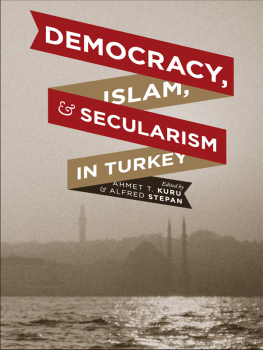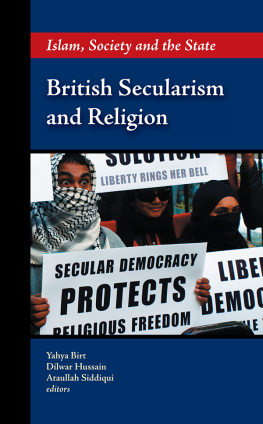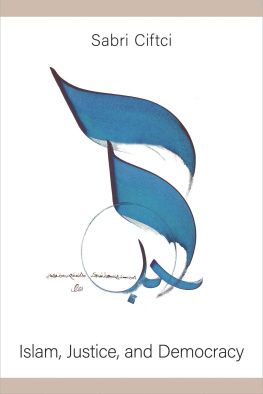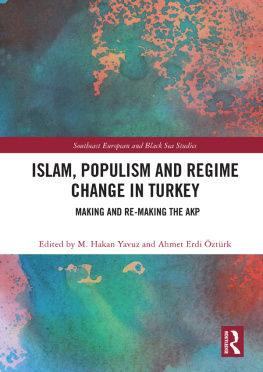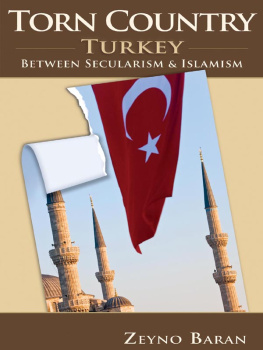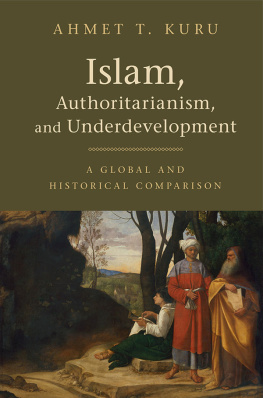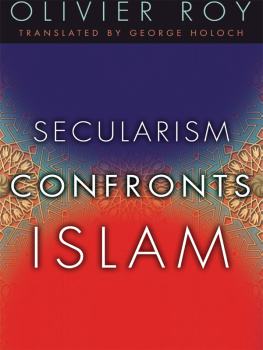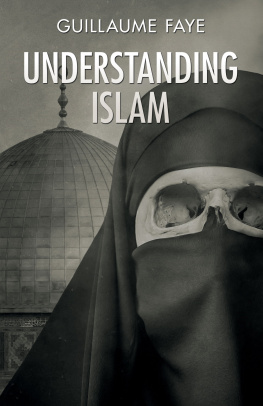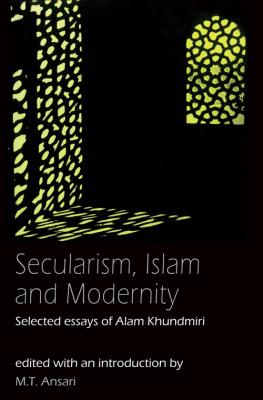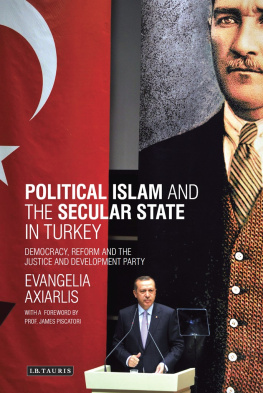Kuru Ahmet T. - Democracy, Islam, and Secularism in Turkey
Here you can read online Kuru Ahmet T. - Democracy, Islam, and Secularism in Turkey full text of the book (entire story) in english for free. Download pdf and epub, get meaning, cover and reviews about this ebook. City: New York;NY;Turkey;Turkije, year: 2012, publisher: Lightning Source Inc. (Tier 3);Columbia University Press, genre: Politics. Description of the work, (preface) as well as reviews are available. Best literature library LitArk.com created for fans of good reading and offers a wide selection of genres:
Romance novel
Science fiction
Adventure
Detective
Science
History
Home and family
Prose
Art
Politics
Computer
Non-fiction
Religion
Business
Children
Humor
Choose a favorite category and find really read worthwhile books. Enjoy immersion in the world of imagination, feel the emotions of the characters or learn something new for yourself, make an fascinating discovery.
- Book:Democracy, Islam, and Secularism in Turkey
- Author:
- Publisher:Lightning Source Inc. (Tier 3);Columbia University Press
- Genre:
- Year:2012
- City:New York;NY;Turkey;Turkije
- Rating:5 / 5
- Favourites:Add to favourites
- Your mark:
- 100
- 1
- 2
- 3
- 4
- 5
Democracy, Islam, and Secularism in Turkey: summary, description and annotation
We offer to read an annotation, description, summary or preface (depends on what the author of the book "Democracy, Islam, and Secularism in Turkey" wrote himself). If you haven't found the necessary information about the book — write in the comments, we will try to find it.
Democracy, Islam, and Secularism in Turkey — read online for free the complete book (whole text) full work
Below is the text of the book, divided by pages. System saving the place of the last page read, allows you to conveniently read the book "Democracy, Islam, and Secularism in Turkey" online for free, without having to search again every time where you left off. Put a bookmark, and you can go to the page where you finished reading at any time.
Font size:
Interval:
Bookmark:
Democracy, Islam, and Secularism in Turkey
RELIGION, CULTURE, AND PUBLIC LIFE
Religion, Culture, and Public Life
Series Editors: Alfred Stepan and Mark C. Taylor
The resurgence of religion calls for careful of new forms of intolerance, as well as new approaches to tolerance, respect, mutual understanding, and accommodation. In order to promote serious scholarship and informed debate, the Institute for Religion, Culture, and Public Life and Columbia University Press are sponsoring a book series devoted to the investigation of the role of religion in society and culture today. This series includes works by scholars in religious studies, political science, history, cultural anthropology, economics, social psychology, and other allied fields whose work sustains multidisciplinary and comparative as well as transnational analyses of historical and contemporary issues. The series focuses on issues related to questions of difference, identity, and practice within local, national, and international contexts. Special attention is paid to the ways in which religious traditions encourage conflict, violence, and intolerance and also support human rights, ecumenical values, and mutual understanding. By mediating alternative methodologies and different religious, social, and cultural traditions, books published in this series will open channels of communication that facilitate critical analysis.
After Pluralism: Reimagining Religious Engagement, edited by Courtney Bender and Pamela E. Klassen
Religion and International Relations Theory, edited by Jack Snyder
Religion in America: A Political History, Denis Lacorne
Democracy, Islam, and Secularism in Turkey
EDITED BY
AHMET T. KURU
AND
ALFRED STEPAN

Columbia University Press New York
Columbia University Press
Publishers Since 1893
New York Chichester, West Sussex
cup.columbia.edu
Copyright 2012 Columbia University Press
All rights reserved
E-ISBN 978-0-231-53025-5
Library of Congress Cataloging-in-Publication Data
Democracy, Islam, and secularism in Turkey / edited by Ahmet T. Kuru and Alfred Stepan.
p. cm.(Religion, culture, and public life)
Includes bibliographical references and index.
ISBN 978-0-231-15932-6 (cloth : alk. paper) ISBN 978-0-231-15933-3 (pbk. : alk. paper)
ISBN 978-0-231-53025-5 (e-book)
1. TurkeyPolitics and government20th century. 2. TurkeyPolitics and government21st century. 3. DemocracyTurkey. 4. Islam and stateTurkey. 5. SecularismTurkey. 6. Cultural pluralismTurkey. I. Kuru, Ahmet T. II. Stepan, Alfred C. III. Title. IV. Series.
JQ1805.D46 2012
320.9561dc23
2011029163
A Columbia University Press E-book.
CUP would be pleased to hear about your reading experience with this e-book at .
References to Internet Web sites (URLs) were accurate at the time of writing. Neither the editors nor Columbia University Press is responsible for URLs that may have expired or changed since the manuscript was prepared.
Contents
The 1982 Constitution of Turkey was drawn up and passed in the immediate aftermath of the 1980 military coup dtat, under the guardianship of the military. Because Turkey is now engaged in the application process for membership in the European Union (EU), many key actors, both in the EU and in Turkey, feel that it is appropriate that a new, more democratic constitution be crafted, but there are also those who fear that the new constitution might lead to the domination in Turkish politics of the currently ruling Justice and Development Party (AKP). A lot is at stake for a great number of people. If Turkey is admitted, it would be the first Muslim-majority country to become a member of the EU, the second most populous member of the EU, and the member of the EU with the largest military force. Most importantly, what is at issue for many observers is whether the AKP, which is seen as an Islamically inspired, conservative, and democratic party, can, like the Christian Democratic Party in Germany before it, maintain some of its roots in religion, but build a welcome addition to the existing models of European democracy.
The politics of revising the existing secular, but not sufficiently democratic, constitution has produced intense intellectual debates, and unprecedented pro and con social mobilization. To discuss this crucial issue, we organized several meetings, including two major conferences at Columbia University in 2008 and 2009, and both of the editors held meetings with some of the contributors in Istanbul in 2009 and 2010. A key participant at our 2008 conference was the distinguished legal theorist and political scientist Ergun zbudunthe president of an academic committee drafting a new constitution (and thus at the center of the debate). A year later, we organized a second, larger conference to analyze some of the most salient and controversial questions about Turkish politics: What are the historical roots and contemporary content of the Kemalist ideology that is now under challenge? Should, and could, Turkeys version of hard, controlling secularism be softened to allow greater space for religious actors in the public sphere, as in other democracies in Muslim-majority societies such as Indonesia and Senegal? How might the guardian role of the Turkish military in politics be reduced? Why have many once anti-Western Muslim groups become supportive of joining Europe, while the historically pro-Western military and its Kemalist allies have become Euro-skeptics? And finally: Can the constitutional crisis that began in 2007 and continues, as of this writing, result in a deepened democracy in a Muslim-majority democracy?
This volume aims to provide comparative insights into this critical period in Turkish and European history. We also believe that our analyses will aid in the more general discussion of one of the most important and fraught issues of our times: Islam, secularism, and democracy. But before undertaking an examination of contemporary politics in Turkey, our volume looks at two of the most important historical legacies of modern Turkey: the Ottoman Empire and Kemalism. Turkey is the successor of the Ottoman Empire, which ruled much of the Muslim world for centuries and in the process developed forms of interreligious toleration that accorded most minorities more liberties than were then available in western Europe. We are fortunate to be introduced to the question of toleration in the Ottoman Empire by Karen Barkey, the author of the prize-winning Empire of Difference: The Ottomans in Comparative Perspective (2008). In Rethinking Ottoman Management of Diversity, Barkey examines why and how the Ottomans created this distinctive premodern form of religious and ethnic accommodation and toleration, and speculates on what parts of this heritage might possibly be of use if the relatively peaceful coexistence among the diverse languages and religions of the Ottoman Empire were allowed to reemerge. Such reemergence will not happen, of course, unless the post-Ottoman, Kemalist legacy is modified to grant more space in the public sphere to some of the newly emerging tolerant and democratic Islamic individuals and groups.
If there is one name that any comprehensive analysis of Turkish politics must include, it is that of Mustafa Kemal Atatrk (18811938), the founder of the Turkish Republic, and if there is one ideology that it must include, it is Kemalism. M. kr Haniolus chapter, The Historical Roots of Kemalism, is therefore crucial reading for any student of the major varieties of modernization theory and of Turkish politics. Haniolu is chair of the Department of Near Eastern Studies at Princeton University and a renowned authority on the political history of the late Ottoman era, especially the thought and activism of the Jeunes Turcs (Young Turks). His essay, in an unprecedentedly critical and deeply insightful way, traces the Young Turks intellectual legacy within Kemalism. According to Haniolu, three intellectual movements (scientism, Westernism, and Turkish unitary nationalism) link Kemalism to late Ottoman thought and to the dominant ideology of the Turkish state; these are only now being challenged by the ruling, Muslim-inspired AKP. There is now much theoretical speculation in contemporary social science, and indeed in our globalized world, about multiple modernities and even multiple secularisms. However, Haniolu documents how, why, and with what consequence Kemalist ideology insists that there is only a single modernity and a single (quite aggressive) secularism in any serious project of modernism in the contemporary world. No comparative analysis of the consequences of Turkeys radical nation-statebuilding strategies in a de facto multiethnic and multicultural context is possible without an understanding of Kemalist ideas about modernity; this concept of modernity still has an important impact on many Turks understanding of the nation-state and secularism.
Next pageFont size:
Interval:
Bookmark:
Similar books «Democracy, Islam, and Secularism in Turkey»
Look at similar books to Democracy, Islam, and Secularism in Turkey. We have selected literature similar in name and meaning in the hope of providing readers with more options to find new, interesting, not yet read works.
Discussion, reviews of the book Democracy, Islam, and Secularism in Turkey and just readers' own opinions. Leave your comments, write what you think about the work, its meaning or the main characters. Specify what exactly you liked and what you didn't like, and why you think so.

